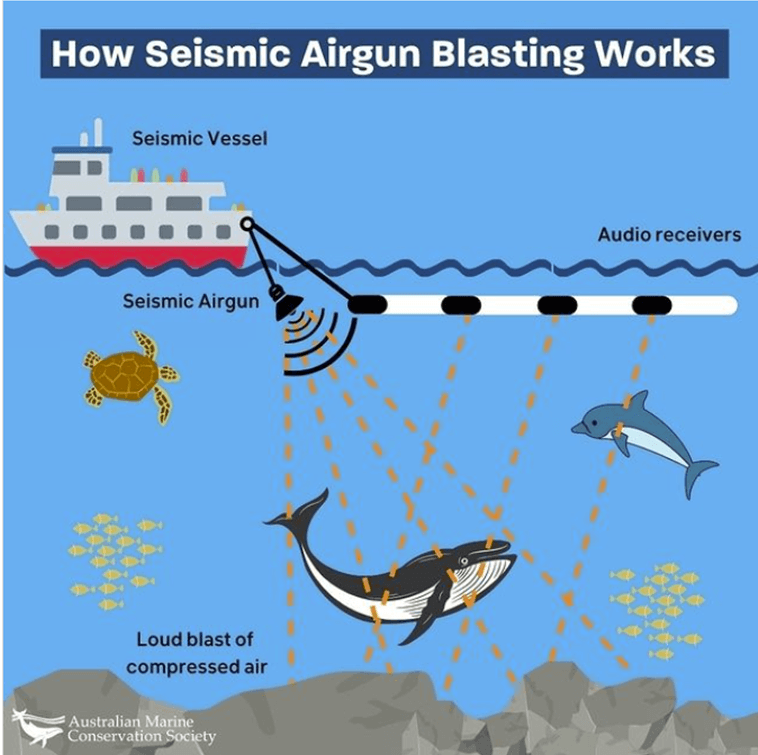Let Minister King know that we need an end to seismic blasting SPA permits to protect endangered species and threatened marine habitats.
A Special Prospecting Authority (SPA) is a specific type of permit that allows companies to buy access to large areas of our oceans to use seismic blasting to search for oil and gas, and Carbon Capture and Storage locations below the ocean floor.
Seismic blasts are how the oil and gas industry surveys the ocean floor. Seismic vessels tow an array of airguns and audio receivers (hydrophones) behind them in the water. These powerful airguns fire loud blasts of compressed air every 10 to 15 seconds, 24 hours a day. The sound waves produced penetrate deep into the seabed and bounce back to the audio receivers. From the sound patterns detected, companies can work out the most likely place to find oil and gas reserves under the ocean floor. The next step is exploratory drilling.
These blasts are among the loudest human-made sounds in the ocean, just short of those caused by explosive devices, and have a devastating effect on marine life.
- Seismic blasting has been connected to temporary and permanent hearing loss, habitat abandonment, mating and feeding disruption and possible death in marine mammals like whales.
- The blasts lead to scallop deaths by compromising their immune systems and have been found to irreversibly damage the organs of lobsters.
- Tasmanian research found seismic blasting also triggers extensive death in plankton, including krill, which are crucial foundations of marine food webs, from more than a kilometre away.
There is a proposal to conduct seismic blasting off the coast of Victoria near Warrnambool and the Apollo Marine Park, by geotechnical company, CGG. The seismic blasting, if allowed to happen, will be right next to critical calving grounds for the endangered southern right whale and inside key foraging habitat of the endangered pygmy blue whale.
Did you know over 600 seismic blasting surveys have been carried out in the Otway Basin alone since petroleum exploration began in the 1960s?
The data collected is subject to ‘commercial in confidence’ regulations, meaning that seismic blasting data can be kept private by the companies who own the data for up to 15 years post-collection.
This allows data companies like CGG to sell seismic data multiple times in that 15-year period – creating lucrative returns that justify undertaking new seismic surveys – even in areas that have been subject to seismic blasting previously – and further damaging our marine life.
Companies’ applications for plans to conduct seismic blasting go to the regulator NOPSEMA for approval, and then to the administrator NOPTA to be granted an SPA permit.
They are both government bodies answerable to the Federal Resources Minister Madeleine King.
- Minister King is responsible for overseeing the administrator NOPTA, which gives approval to companies seeking SPA permits to conduct seismic blasting. The Minister can refuse a permit.
- Minister King can act to abolish SPAs to clean up the industry and keep some of the largest and most damaging seismic blasting projects out of Australian waters.
This gives Minister King authority on behalf of the Australian Government to shape the industry’s practices and safeguard our marine environments.
We need the Australian Government to take action to abolish these quick, cheap and harmful seismic blasting permits.
By abolishing SPA permits, we are helping to turn the tide on the harm caused by seismic blasting, removing this permit that fails to assess companies’ fitness and proper standing to operate, and keeping some of the largest and most damaging seismic blasting projects out of Australian waters.
This action is about safeguarding critical marine habitats, preserving biodiversity, and protecting the livelihoods of communities that depend on healthy oceans.
Add your name to send an email to Minister King.

Featured image credit: © Christian Åslund